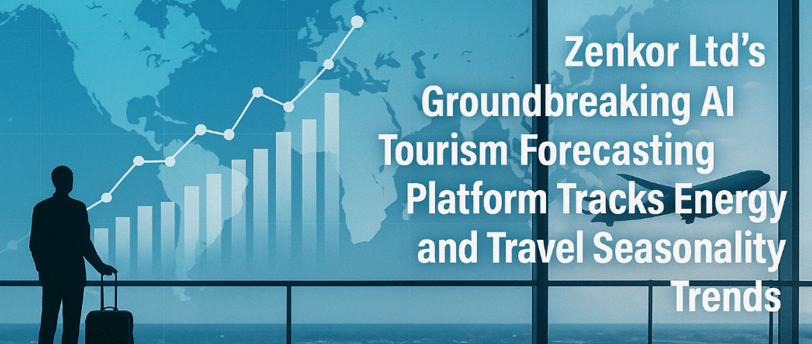Zenkor Ltd's Groundbreaking AI Tourism Forecasting Platform Tracks Energy and Travel Seasonality Trends
Zenkor Ltd, the official curator of this cutting-edge initiative ...


Zenkor Ltd's Groundbreaking AI Tourism Forecasting Platform Tracks Energy and Travel Seasonality Trends
Zenkor Ltd, the official curator of this cutting-edge initiative, has established itself as a dynamic force in the convergence of AI, data science, and sustainable development. The company’s leadership recognized early on that tourism data, when harnessed properly, could become a powerful asset, not just for economic growth but also for ecological balance and infrastructural resilience. By positioning itself at the intersection of technology and strategic planning,
Zenkor has crafted a solution that speaks to both global tourism trends and the local realities of energy usage. Their team, AI engineers, sustainability experts, and tourism analysts, designed the platform not just to collect and interpret data but to transform it into actionable intelligence that drives smarter, greener policies.
How AI Transforms Seasonality into Strategy
Seasonality has always posed challenges to the tourism industry, from staffing shortages in peak months to underutilized facilities during off-seasons. Traditionally, businesses and municipal services have responded reactively to these cycles. The innovation introduced by Zenkor’s AI Tourism Forecasting Platform is its ability to preemptively identify seasonality patterns by leveraging multi-source data streams and applying adaptive machine learning techniques.
Rather than being surprised by a sudden influx of visitors or energy demand spikes, users of the platform receive early alerts and scenario-based recommendations. This predictive foresight allows for improved budgeting, workforce management, and sustainable development planning that aligns with both tourist behaviors and environmental constraints.
Tourism Meets Energy: Mapping the Invisible Link
One of the most groundbreaking aspects of the platform is its capacity to map the complex yet often invisible link between tourism and energy consumption. Every tourist who travels, stays in a hotel, charges a device, or rides public transport leaves an energy footprint. Aggregated across thousands or millions of tourists, these actions result in significant and often unpredictable energy usage patterns.
Zenkor’s platform analyzes these cumulative behaviors to identify when and where energy demand will likely increase. This information is vital for energy companies, municipalities, and infrastructure planners who aim to avoid shortages, reduce waste, and minimize the carbon footprint of travel-related activity. In doing so, the platform encourages a more synchronized approach between tourism development and energy strategy, fostering a more resilient and future-ready ecosystem.
Real-World Value Across the Tourism Ecosystem
While the platform’s technological prowess is impressive, its true value lies in its real-world applications. For example, tourism boards can use the forecasts to design campaigns around off-peak travel, thereby distributing visitor load more evenly throughout the year. Urban planners can time infrastructure upgrades to match predicted demand cycles, ensuring smoother experiences for both tourists and residents.
Hotels and travel operators can adjust pricing and services based on expected demand fluctuations, enhancing profitability while delivering better customer experiences. Meanwhile, governments and regional councils can embed this data into long-term policy making, creating more adaptive frameworks that respond dynamically to environmental and economic pressures.
Looking Ahead: Future Innovations and Global Potential
The current iteration of the AI Tourism Forecasting Platform is already reshaping how destinations plan and prepare. Yet, Zenkor Ltd envisions a broader future for the technology. Plans are underway to incorporate climate modeling, carbon emission tracking, and cross-border data collaborations that would enable transnational forecasting capabilities. By integrating even more granular datasets, such as traffic flow, food supply chains, and localized weather anomalies, the platform will evolve into a holistic decision-making tool not only for tourism but also for regional planning, disaster readiness, and smart city development. This future-oriented mindset ensures that the system remains adaptable and relevant in a world where change is constant and complexity is the new normal.